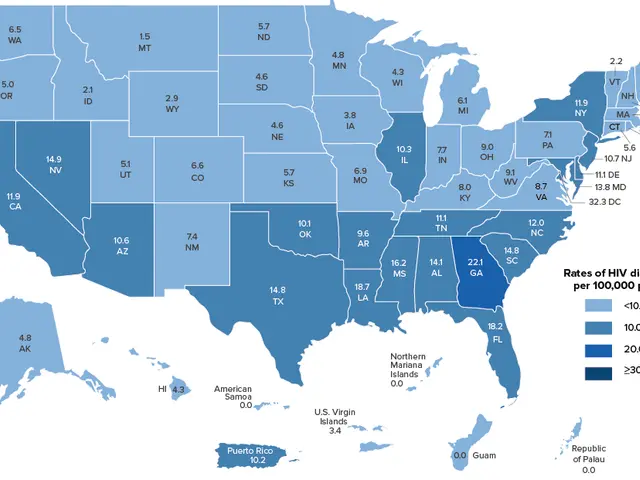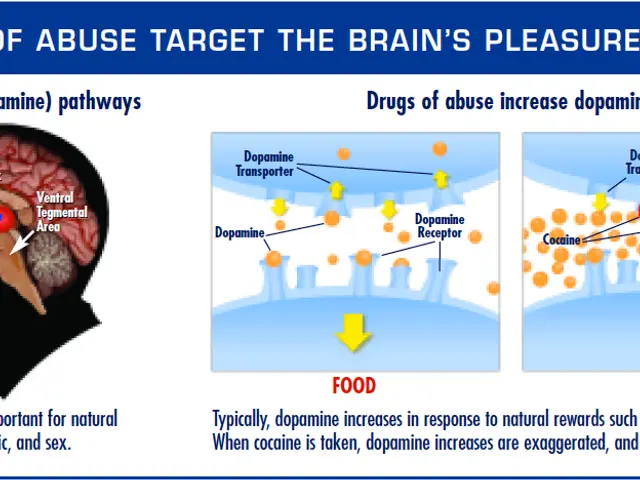Caffeine Intake: Determining the Excessive Limit
In the world of stimulants, natural substances like green tea and hydrating alternatives such as lemon water and coconut water have emerged as potential caffeine alternatives for those seeking a change. However, it's crucial to understand the potential risks associated with caffeine consumption, particularly its impact on mental health.
For some individuals, caffeine sensitivity or allergy may necessitate avoiding it entirely. In such cases, it's best to opt for caffeine-free alternatives to maintain overall well-being.
Excessive caffeine intake, more than the general safe limit of 400 milligrams per day for healthy adults, can lead to a host of mental health issues. These include increased anxiety and nervousness, worsened mood and mental health outcomes, sleep disruption, and dependence and withdrawal symptoms.
High doses of caffeine stimulate the release of adrenaline and cortisol, heightening feelings of anxiety and nervousness, especially in those predisposed to anxiety disorders. Prolonged or excessive caffeine consumption has been linked to an increased risk of anxiety and depression, as well as a greater likelihood of suicide ideation and suicide attempts, particularly among frequent consumers of caffeinated energy drinks.
Excessive caffeine, especially when consumed later in the day, often leads to insomnia or poor sleep quality. Poor sleep then creates a vicious cycle, further impairing mental clarity, productivity, and emotional regulation. Over time, high caffeine intake can lead to physical dependence, with withdrawal symptoms—such as headaches, irritability, fatigue, dizziness, and shakiness—emerging, which may further strain mental well-being and increase the risk of mood disturbances.
Pregnant women are advised to limit their caffeine intake to less than 200 milligrams per day, according to the American College of Obstetricians and Gynecologists. In severe cases of caffeine overdose, symptoms can include vomiting, disorientation, and seizures, necessitating immediate medical attention and often hospitalization.
It's important to be mindful of medication interactions with caffeine and always consult a healthcare provider if there's uncertainty. Energy drinks often contain less caffeine than a standard cup of coffee, but can also include other stimulants. Caffeine can boost metabolism, aid in fat burning, and enhance athletic performance, but over-consumption may lead to heart palpitations and sleep disturbances.
The caffeine content in various beverages varies significantly, with coffee typically containing more caffeine than tea. Children and adolescents should consume no more than 2.5 milligrams per kilogram of body weight, according to Health Canada. Caffeine tolerance varies greatly among individuals, influenced by factors such as weight, age, and health conditions.
In summary, while moderate caffeine use can offer alertness and improved focus, excessive consumption is closely linked to anxiety, depression, sleep problems, and even more serious mental health issues. Sensitive individuals or those with pre-existing mental health conditions are especially susceptible to these negative effects. It's always best to approach caffeine consumption mindfully and consult with a healthcare provider when necessary.
- For those seeking a change in their lifestyle, natural caffeine alternatives like green tea, lemon water, and coconut water offer potential options for hydration and relaxation.
- In the realm of health-and-wellness, it's crucial to be aware of the impact of caffeine on mental health, particularly in cases of sensitivity or pre-existing conditions.
- To maintain overall health, be cautious about consuming excessive caffeine, as it can lead not only to mental health issues such as anxiety, depression, and sleep disorders but also to physical symptoms like heart palpitations.
- When considering fitness-and-exercise routines, factor in caffeine consumption carefully, given its potential impact on sleep quality, mental clarity, and emotional regulation.
- In the realm of nutrition, caffeine can provide benefits like metabolism boosting and enhanced athletic performance, but overindulgence may lead to unwanted health consequences.







